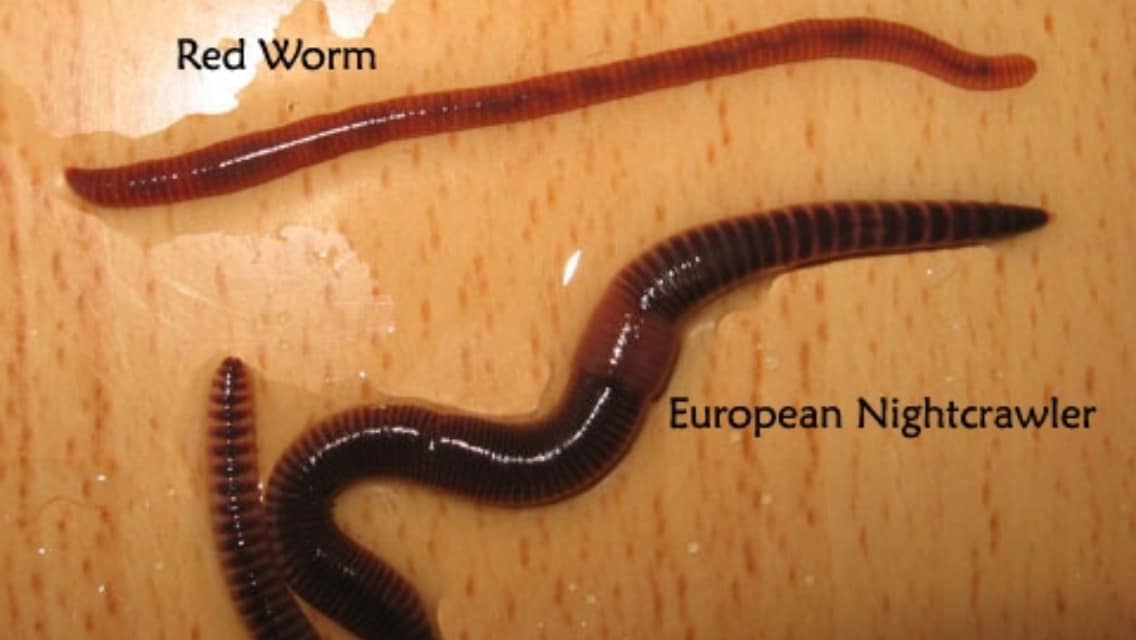Sure, there are lots of worms in your garden but they aren’t the best options for your compost So how do you know which worm is best for your compost? Well, that's where we come in Below, we break down the two most popular worm types to help you make the best decisions for your soil
Red Wiggler and European Nightcrawler set the gold standard for compost worms.. These two beauties prefer a compost environment as opposed to plain soil. They are very low maintenance. They feed on vegetable waste, compost, and organic bedding. The castings produced in this way are richer than worms that only feed on plant soil
Red Wigglers, although smaller (approx 1-1⅕ inches in length) supply an ideal balance of potash, phosphates, and nitrogen as well as other plant nutrients required by your garden. Another plus for the Red Wigglers is their ability to get to work as soon as you put them in your garden or compost. Red Wigglers tolerate a wide range of temperatures, so they will happily keep composting in very high temperatures. They can even survive the slightly heated compost by moving to the edges. They are also phenomenal reproducers.
Our next best option is the European Night Crawler. These guys are quite a bit larger averaging 2-3 inches in length.
Their specialty is thriving and working in almost any soil environment. They are stronger than Red Wigglers and therefore better for larger tougher food scraps that may be harder to break down.
Their skin is thicker than Red Wigglers, which allows the Euro to withstand dry conditions, penetrate harder grounds and make them quite cold and heat resistant Euros can thrive in your protected compost bin throughout the year..
The downside to the European Night Crawlers is that they have a much slower reproduction rate than Red Wiggles and a much shorter life span.
The bottom line is that you can’t go wrong with either worm. They are both easy to maintain and consume your organic waste. They produce beautiful worm castings and can help any soil produce better organic quality results
Whichever worm you decide is best for your garden we suggest that you should order these worms only during the cool seasons to avoid a high death rate due to the heat.
As always feel free to leave us some feedback or just say Hey in the comments
The worm lover behind this post - Kris Moriarty- Blog writer for Meme’s Worms. Making our planet a greener place one garden at a time!

🪱 Best Worms for Composting and Fishing
When it comes to turning waste into nutrient-rich soil or catching your next big fish, choosing the right worms makes all the difference. Some worm species excel at breaking down organic matter into rich compost, while others shine as durable bait for fishing.
But what if you could find worms that are great at both? Let’s explore the best worms for composting and fishing, how they differ, and how you can make the most of them.
🧺 Why Worm Choice Matters
Not all worms are the same. Garden worms or earthworms that live deep in the soil aren’t ideal for compost bins — they prefer cool, dark environments and don’t thrive in surface-level compost. Composting worms, on the other hand, live near the surface and feed on decaying organic material.
The right worms will help you:
- Speed up decomposition
- Produce nutrient-rich worm castings (black gold for your plants)
- Maintain a healthy bin with minimal odor
- Reproduce quickly for long-term composting or bait supply
Must Read : Best Worms for Composting: Red Wigglers vs Indian Blues vs Nightcrawlers
🪶 1. Red Wigglers (Eisenia fetida) — The Composting Champions
Red Wigglers are the most popular and reliable worms for composting — and for good reason! They thrive in warm, moist environments and can process large amounts of food waste quickly.
These little powerhouses eat their weight in scraps every day and reproduce rapidly, making them perfect for maintaining a continuous compost cycle.
Why They’re Great for Composting:
- Extremely fast composters
- Adapt well to indoor or outdoor bins
- Tolerate a wide temperature range
- Reproduce quickly and live close to the surface
For Fishing:
Red Wigglers can be used as bait for smaller fish species like bluegill, perch, or trout. Their lively movement makes them attractive to fish, though they’re smaller compared to nightcrawlers.
👉 If you’re looking for a hardworking worm that also doubles as light fishing bait, Red Wigglers are your best bet.
🪸 2. European Nightcrawlers (Eisenia hortensis) — The Dual-Purpose Worm
If you’re searching for the best all-around worm that works for both composting and fishing, look no further than the European Nightcrawler.
Slightly larger and stronger than Red Wigglers, these worms are highly active and perfect for anglers. They’re tough enough to stay on the hook and lively enough to attract big catches like bass or catfish.
Why They’re Great for Composting:
- Thrive in compost bins just like Red Wigglers
- Handle a wider range of food waste
- Burrow deeper, helping aerate your compost
Why They’re Great for Fishing:
- Thicker and longer than Red Wigglers
- Wiggle actively underwater — irresistible to fish
- Stay alive longer on the hook
👉 For composting enthusiasts who also love to fish, European Nightcrawlers are the perfect “two-in-one” worm.
🌱 3. African Nightcrawlers (Eudrilus eugeniae) — The Tropical Powerhouses
If you live in a warmer climate, African Nightcrawlers might be your best choice. They’re larger, fast breeders, and produce some of the highest-quality castings.
Why They’re Great for Composting:
- Produce large amounts of worm castings quickly
- Thrive in warm, humid environments
- Great for large-scale or outdoor compost setups
For Fishing:
Their size and movement make them excellent bait for large fish. However, they’re sensitive to cold weather, so they’re not ideal for cooler regions.
Must Read : What Are The Different Types of Nightcrawler Worms?

🪤 Composting vs. Fishing: Choosing What’s Right for You
| Purpose | Best Worm Type | Key Benefits |
|---|---|---|
| Home Composting | Red Wigglers | Fast reproduction, easy care |
| Large Outdoor Compost | African Nightcrawlers | Handles high volume, warm climates |
| Compost + Fishing Combo | European Nightcrawlers | Strong, lively, and dual-purpose |
| Fishing (Cold Climate) | Common Nightcrawlers | Hardy and long-lasting bait |
Tips for Keeping Worms Healthy
- Keep bedding moist but not soggy
- Maintain temperature between 55–80°F (13–27°C)
- Feed small amounts regularly — avoid meat, citrus, and dairy
- Harvest castings every 2–3 months
- For fishing use, store worms in cool, damp soil or worm bedding
Healthy worms mean productive composting and active bait — it’s a win-win!
Final Thoughts
When it comes to finding the best worms for composting and fishing, Red Wigglers and European Nightcrawlers lead the pack.
Whether you want to reduce food waste, create organic fertilizer, or catch your next trophy fish, these versatile worms are your ultimate eco-friendly allies.
Ready to Start?
You can buy live Red Wigglers and European Nightcrawlers directly from Meme’s Worms — shipped fresh, healthy, and ready to work! Perfect for compost bins, worm farms, and fishing trips.




1 comment
Kbore
I’m sorry I ordered my worms in July, please forgive me, I didn’t know….
Leave a comment
All comments are moderated before being published.
This site is protected by hCaptcha and the hCaptcha Privacy Policy and Terms of Service apply.